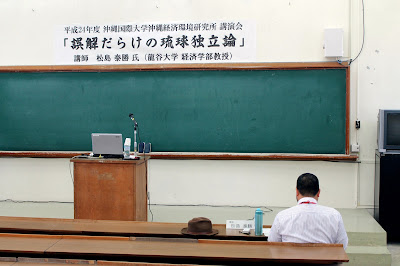Okinawan Independence
“Okinawan Independence”
Michael Lujan Bevacqua
April 10, 2013
The Marianas Variety
Professor Yasukatsu Matsushima is a strong, but polite voice for Okinawa's Independence. I first met him last year while he was in Guam doing research. I ended up taking him on a hike to Pagat. Later he invited me to come to Okinawa and speak at several conferences on decolonization. On my most recent trip to Okinawa, I was fortunate enough to hear him give a lecture at Okinawa International University on “The Myths of Okinawan Independence.” Although the topic of Okinawa’s independence is very new and somewhat taboo, his talk was crowded with people wanting to know more.
Professor Matsushima may seem assuming at first, but make no mistake he is resolute in his belief that Okinawa should be an independent country. This advocacy has made him somewhat notorious. In both Okinawa and Guam independence is something considered taboo, impossible or anti-Japanese/American. Because of this it can be difficult to simple just broach the topic with people. Both Guam and Okinawa have lived in somewhat comfortable colonial relationships and the possibility that this might be disrupted naturally creates feelings of fear and anxiety.
So instead of talking about the possibilities and new freedoms independence might mean, you end up dealing with the unrealistic fears that people have. Independence does not mean you have to do everything on your own. It does not mean you can’t have a good strong relationship with your former colonizer. It doesn’t mean you have to grow all your own food. It doesn’t mean the enemies of freedom invade you the next day. But these fearful fantasies get in the way and prevent any substantive discussion from taking place.
Professor Matsushima’s presentation was meant to dispel the “misunderstandings” about the possibilities for Okinawan independence. He did so by discussing the topic in a normal and everyday way, defying the expectations that people had of it being a frightening and crazy. It was very effective.
In truth, independence is not scary; or rather it should not be a scary concept. Like the other two common political status options, free association and statehood (integration) each has their own positives and negatives. There are very good reasons to support Independence as a future status for Guam, and there are reasons to be wary of it and critical. One of the best ways that I find to promote independence as a political status option is to discuss it in a very normal and regular way. The naturalness is something that can help many people who may not actually be against it, but merely feel as if they are supposed to resist it or be against it.
When people hear things such as independence they tend react to it in a narrowing sense and interpret the concept in a very insular and isolated way. Independence is seen as breaking away from the world, cutting yourself off, leaving behind everyone else, including the colonizer. The world of possibility seems to crash down around this concept.
Matsushima presented independence in a much more expansive and inclusive way. He presented the history of other places similar to Okinawa in terms of size and population who have achieved their independence already. He also gave the historical context for places like Guam who are currently seeking decolonization, for which independence is an option. He also politely reminded people that independence is a very normal thing. There are close to 200 independent countries in the world today. Independence can be difficult but it is nothing scary or terrible. It is something to discuss because it may have benefits for Okinawa, and when you look at world history there appears to be a natural evolution from colony to sovereignty.
This is a point that I often make to people on Guam. Why have so many other places become sovereign and independent? Why can’t Guam? Every colony has to contend with an idea that they are inadequate and inferior. A discourse is planted in the colonies that creates feelings of dependency and a fear of becoming independent. It has nothing to do with smallness or with being an island or with having a certain history. There were plenty of Indians who believed that if they weren’t under the British everything would fall apart and they would never survive. This is an effect of colonization, these feelings that you can never be good enough, that your culture is holding you back or that domination by another is the only way to keep out the terrors of the world. These are fictions and fantasies that serve to fundamentally disempower us.
There is no fundamental reason why Guam and Okinawa could not become independent nations. There are plenty of political, economic and social issues that have to be contended with, and it would no way be easy, but there is nothing impossible about it. A key to both Mastsushima’s argument as well as my own is that independence is normal, what Guam and Okinawa have is abnormal. Our political statuses today are the one’s that don’t belong. Independence does not mean isolation, but rather entering, as a sovereign entity a new network of interdependence.




Comments